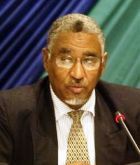Sudan seems more flexible to UN force to Darfur
May 18, 2006 (KHARTOUM) — Sudan on Thursday appeared to ease its opposition to a U.N. force in its violent Darfur region saying high-level talks with the United Nations were starting which would open a “new window” in relations.
 An under-funded and under-equipped AU force monitoring a truce in Darfur has been unable to stop militia attacks on civilians caught in the crossfire of a conflict which has claimed tens of thousands of lives in the past three years.
An under-funded and under-equipped AU force monitoring a truce in Darfur has been unable to stop militia attacks on civilians caught in the crossfire of a conflict which has claimed tens of thousands of lives in the past three years.
Darfuris, the AU and the international community have called for U.N. forces to take over from the AU but Sudan had fiercely rejected the move before a peace deal was signed on May 5.
Presidential Advisor Majzoub al-Khalifa said U.N. Secretary-General Kofi Annan had telephoned the presidency and would send a high-level team to Sudan within 48 hours from Thursday to begin consultations on a U.N. assessment mission.
“This is a good gesture from the U.N.,” Khalifa, head of the government’s peace negotiating team, told Reuters.
“There is a retreat from the Security Council and (they) opened a new window for discussion and dialogue with the government of Sudan,” he added.
The U.N. Security Council passed a resolution on Tuesday saying a U.N. team, charged with determining how to transfer the AU mission in Darfur to U.N. troops, had to begin work within a week in order for troops to be in place quickly.
The AU agreed last week in Addis Ababa to transfer the mission as soon as possible. But Sudan has not only previously rejected the notion of U.N. troops in its vast west, it has refused entry to the U.N. assessment team.
Khalifa would not say if the government had changed its position on allowing the assessment team in, but said the talks were “a step forward”.
Thousands of Darfuris who fled their homes to miserable camps have demonstrated daily against the peace deal, asking for U.N. troops to be sent to protect them. They have attacked AU forces, further restricting the force’s ability to work.
The United Nations has said it wanted a stronger mandate for peacekeepers to protect civilians, not just protect peace monitors. Khalifa said the government’s main concern was the mandate of any U.N. force in Darfur.
“We are not against the AU, we are not against the U.N. (but) … if the mandate is not agreeable to the government of Sudan, this is a very serious issue,” Khalifa said.
Sudan had also raised objections over the possible make-up of an international force, which it portrayed as a possible Iraq-style coalition of Western forces that would attract jihadists to Darfur.
The United Nations and the AU have said the green-helmeted AU troops would remain with additional troops coming in under the blue flag of the United Nations.
In an apparent change of position, Khalifa said on Thursday the transition was merely a change of hats.
“The U.N. troops and the AU troops are the same — this is a transition of hats, of colour,” he said.
The peace deal in the Nigerian capital Abuja was signed by only one rebel group faction. Two other factions refused to sign despite intense global pressure, saying it did not meet the demands of the people of Darfur.
Khalifa said the deal would not be changed nor would any additions be made, but that the government would talk to any factions to bring them in to sign the deal.
(Reuters)
